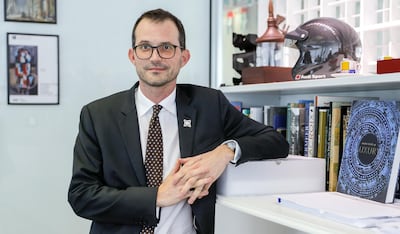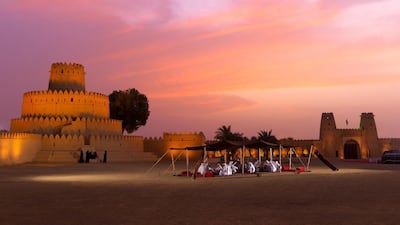Louvre Abu Dhabi is reopening its doors on Wednesday, June 24: visitors will once again be able to marvel at its collection and stand under Jean Nouvel's famed dome.
But is it really going to be the same museum?
The coronavirus pandemic has shaken the world in many ways – financially, psychologically and philosophically. Cultural institutions have been impacted too: like the rest of us, museums will emerge from this period with new perspectives and methods of operating.
For Louvre Abu Dhabi, one noticeable difference will be its physical capacity, with the museum and the rest of the Abu Dhabi’s cultural sites operating at 40 per cent and a new booking system requiring visitors to schedule slots, three hours is the maximum.
On its second anniversary in November, the museum touted its record of welcoming two million visitors since its opening in 2017. With the new Covid-19 guidelines, as well as travel restrictions, museum director Manuel Rabate knows previous metrics of success will have to be viewed through a different lens.
"The number of footfall has always been the most obvious and tangible way of measuring success, but it is now challenged. Between the restrictions on transportation and our own restrictions that we are putting to make sure the experience is safe, there will of course a severe downfall on that," he tells The National.
New ways to measure success
“[Success] becomes more complex to communicate on, because one figure is very simple and has a certain gravitas, but in Louvre Abu Dhabi, we always wanted to have other qualitative elements to capture our role in the communities,” he explains.
Inevitably, the museum's "digital footprint", such as website visits and app downloads, has now become more important. Louvre Abu Dhabi has stepped up its online resources, such as the launch of a cinematic podcast We Are Not Alone by Soundwalk Collective and a virtual tour of its current exhibition Furusiyya: The Art of Chivalry between East and West.
Rabate adds that the museum’s goals include issues such as accessibility and outreach. “One of our KPIs [Key Performance Indicators] is the accessibility for people of determination. A universal museum has to be universally accessible,” he says, pointing out that the museum has new guides for the hearing and visually impaired.
Another example of qualitative success for the museum is its educational outreach, which includes frequent school trips and collaborations with universities such as New York University Abu Dhabi for research initiatives.
With schools to continue distance learning until the end of this year and potentially into next year for some, Rabate says Louvre Abu Dhabi is now looking into how it can harness its digital tools towards educational initiatives.
The director, who has headed up the museum since 2016, says it was “painful” to see it close in mid-March. With the reopening, he seeks to continue Louvre Abu Dhabi’s core message of universality.
“The Louvre has always been a mindful museum. It has always been a museum where civilizations and cultures are in dialogue… The virus has attacked what we represent. Our DNA is to say the fact that we have a connected history to create objects of beauty. When a virus comes and challenges the capacity for people to connect physically, this is really our DNA that is attacked. For us, the way to answer that is to remind us that we have to be mindful of the other,” he says.
As part of its response, the museum is developing health and wellness programmes to tackle mental health issues head on, which will become part of its public programming after the summer.
“We can go further in terms of creating wellness within Louvre Abu Dhabi. It can be in mental health, end-of-life or anxiety treatment. There are plenty of ways to consider what we can give. We are actively working to find medical partners to see how we can play our role in the next phase,” Rabate says.
Universality in a fractured world
“We think of the museum as a public space, a civic space, an educational space, a contemplative space that is important for society and the communities after the crisis. You can come back to Louvre Abu Dhabi to study, to find solace, to socialise," Rabate points out.
"It is a way for us to go beyond the crisis and feel better. Beauty helps to elevate us,” he says.
But will the museum's mission to be a universal one be altered by what the pandemic has revealed? Long-standing inequalities have risen to the surface; and a global movement towards the recognition of colonial histories and against racism is taking root, sparked by the Black Lives Matter protests in the US. The next time the public steps into spaces of arts and culture, they may be yearning for nuanced narratives that dive into the difficult subjects of our history and our time.
“There is a global discussion going on, but I don’t think it is just now," Rabate explains. "I think it is also a question of the trajectory of history and civilization. At Louvre Abu Dhabi, there are good stories of inspiration, but sometimes there are stories of people stealing objects, moving objects, populations of artists changing. We want to show art history’s complexity, the differences and the universal story,” he says.
Fascinating facts about Louvre Abu Dhabi:
Manal Ataya, director general of Sharjah Museums Authority, recently penned an op-ed in The National about the role of museums in sparking dialogue about matters of race, gender, inequality and indentity. "I believe museums are effective vehicles for social change and have a duty to engage with social agendas of their communities and not remain silent," she wrote.
For Rabate, Louvre Abu Dhabi’s cross-cultural mission remains the same. “Every museum has a mandate. It has a position in society. At Louvre Abu Dhabi, we are trying to show the beauty of the exchange and dialogue of culture and civilisation. We take part in this debate with our tools… Our analysis is on the 10,000 years of history.”
Louvre Abu Dhabi and other Abu Dhabi cultural sites, including Cultural Foundation and Qasr Al Hosn reopen on Wednesday, June 24






















